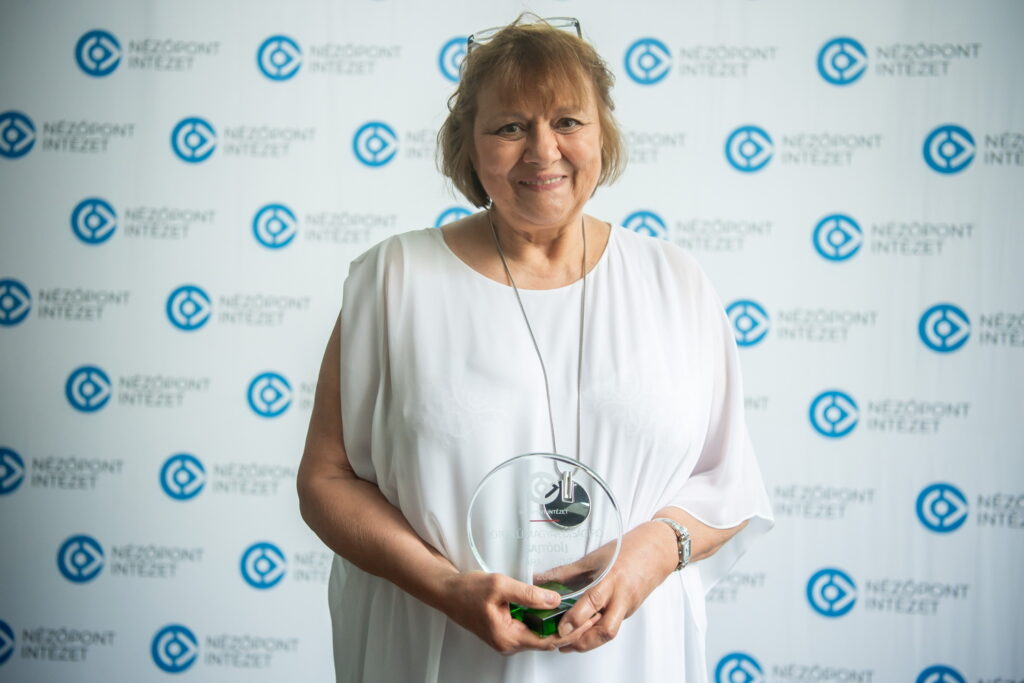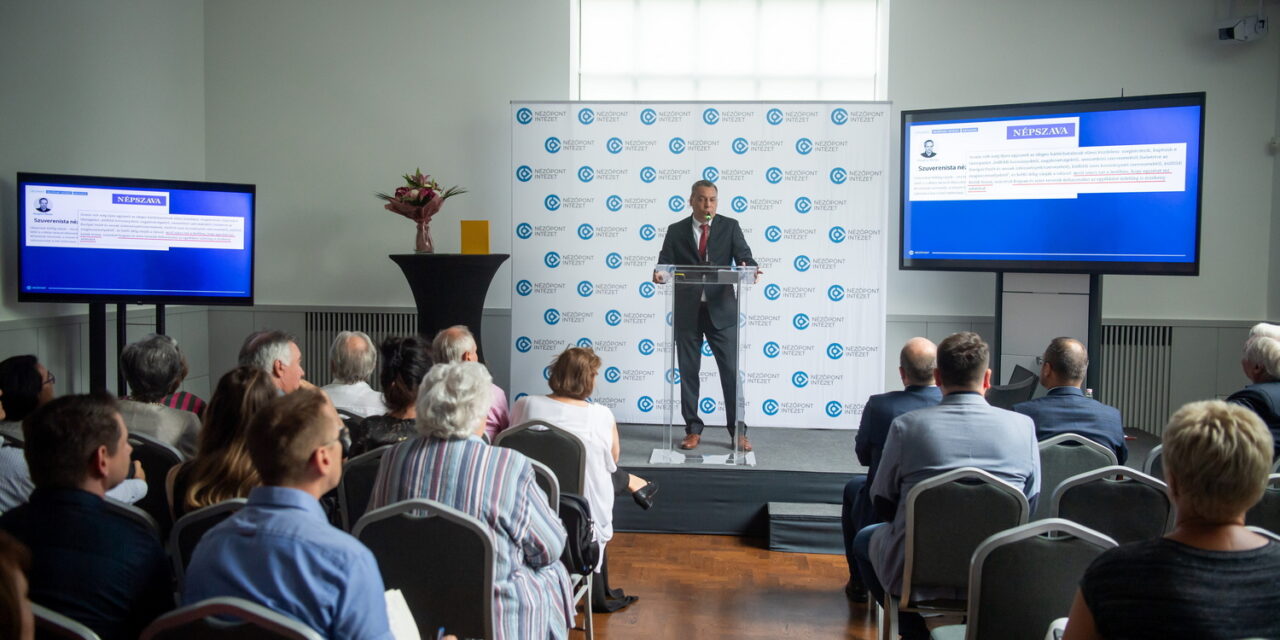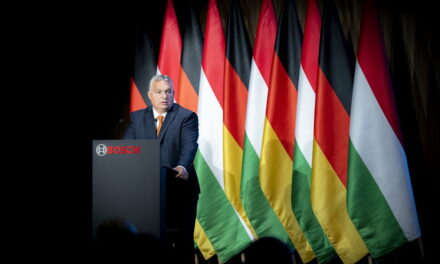The opposition media have been consistently profitable in recent years, in 2023 they generated a profit of around four billion forints, "they are so oppressed."
At least one billion forints worth of foreign resources are received annually by opposition and government-critical media, said Levente Boros Bánk, director of political analysis at the Nézőpont Institute, at the event presenting the institute's analysis entitled Press Freedom in Hungary 2023.
The director put it this way: this amount is only an estimate, which - in his opinion - could even exceed HUF two billion.
"Everyone has the right to find out in Hungary - especially in such a political situation as is currently being experienced in Europe and the world - who finances certain projects, why and with what intention"
he drew attention. He added that the Nézőpont Intézet "surveyed" the publishers of domestic press products about the amount of foreign support they receive, but only 5 publishers of the "politically relevant opposition media" were willing to answer.
"in the interest of transparency, for the sake of informing citizens and readers", they recommend introducing a self-declaration obligation regarding who, when, from where and for what purpose accepts foreign subsidies.
He pointed out:
the opposition media have been consistently profitable in recent years, in 2023 they generated a profit of around four billion forints, "they are so oppressed."
He also mentioned that the former president of the National Association of Hungarian Journalists (MÚOSZ), Miklós Hargitai, complained that the Nézőpont Institute was investigating foreign subsidies for press products.
According to the institute's point of view, at the same time, in a tense international space, especially in a war situation, where they want to force Hungary into the Ukrainian-Russian conflict, it is worth looking at who are the foreign factors who - even with the intention of overthrowing the government - want to influence public opinion through the press.
The "happy times of peace" are over
Regarding sources from abroad, he said as an example that the Partizán YouTube channel writes about HUF 570 million in foreign support in its annual report, "the details of which we know nothing about." The publisher of Nyugat.hu received more than HUF 80 million in foreign funding, while Magyar Jeti Zrt., publisher of 444.hu, reported HUF 42 million in reader support and HUF 150 million in foreign funding.
Levente Boros Bánk summed it up as follows: according to their experience
media reports are not transparent, and foreign governments only partially publish where and what kind of subsidies are distributed.
Revealing the exact financing schemes on the EU website requires serious research, and "chain financing" cannot be followed at all, he added.
Tamás Lánczi, the President of the Sovereignty Protection Office, stated in his speech that national sovereignty is under attack in Hungary and other countries as well.
The "happy times of peace" are over, we have entered an era of great global transformation, "states are collapsing before our eyes, political constellations are shaking, trade relations are ending", a huge battle is taking place between the sovereignists and the globalists, he said.
The main tool is the public
When the Hungarian sovereignty protection law and office are attacked, Hungarian sovereignty is actually at the center of the attack, he declared. He added that it is necessary to remain loyal to Hungarian interests and values as a defense, and to identify those actors who are opponents of Hungarian sovereignty.
Tamás Lánczi said that the Office for the Protection of Sovereignty is not an authority, their task is not to imprison people, their main tool is the public, and they want to point out that certain forces support themselves with foreign support and carry out their activities according to foreign interests.
In order to uncover hidden interests, in addition to the media in the traditional sense, they must monitor social media, they must monitor pressure groups (NGOs) financed from abroad and those political actors who shape Hungarian public opinion as public experts, the president pointed out.
He touched on the fact that a disinformation narrative analysis will soon be made public, in which it will be shown what political interpretations that are against Hungarian interests appear in Hungary, and the narratives related to the Russian-Ukrainian war will be examined for the first time.
This year, Judit Járai received the Jótollú Hungarian journalist award
Tamás Lánczi, referring to the Jótollú Hungarian journalist award presented at the end of the event, said that there are honest journalists who adhere to the ethical standards of the profession and do the work that the community needs.
"They shouldn't be thrown out with the bathwater", but
a distinction must be made against those who masquerade as journalists, but in fact carry out disinformation activities and represent foreign interests, and we should not be afraid to name them, because "this does not impair the freedom of the Hungarian media"
he said.
He stated that Hungary has never denied other countries the right to protect their sovereignty with whatever means they want, but they should not deny this right to Hungarians either.

Judit Járai, employee of the Media Service Support and Asset Management Fund (MTVA), foreign policy journalist, war correspondent and author of several books, this year's winner of the Jótollú Hungarian journalist award at the event presenting the analysis of the Nézõpont Institute Press Freedom in Hungary 2023 in Budapest, at the headquarters of the Civil Hungary Foundation 2024. on June 25.
MTI/Zoltán Balogh
At the event, the Jótollú Hungarian journalist award was presented for the sixth time, which this year went to Judit Járai, an employee of the Media Support and Asset Management Fund (MTVA).
Levente Bánk Boros praised the awardee and said that Judit Járai has been working in the public media since the regime change, a foreign policy journalist, a war correspondent and the author of several books. During his career, he met, for example, Francois Mitterrand, former French president, Desmond Tutu, the Nobel Peace Prize-winning South African human rights activist, and Henry Kissinger, the former US Secretary of State. He was there in South Africa when Nelson Mandela changed the regime, and he was also there in Rwanda amid the tensions between the Huthis and the Tutsis.
MTI
Cover photo: Levente Boros Bánk, director of political analysis at the Nézõpont Institute, speaks at the event presenting the institute's analysis entitled Press Freedom in Hungary 2023 in Budapest, at the headquarters of the Civil Hungary Foundation on June 25, 2024.
MTI/Zoltán Balogh













